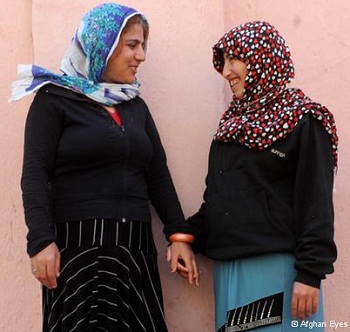Deutsche Welle, December 18, 2012
Mental illness is rampant in Afghanistan
According to the American Medical Association, around 70 percent of the Afghan population suffers from psychological disorders
By Hasrat-Nazimi, Waslat
According to the American Medical Association, around 70 percent of the Afghan population suffers from psychological disorders. Mentally challenged people face discrimination and their families suffer.
"Mohammad! Madman!" the children cry after him. They laugh and make jokes. Mohammad does not know how to answer and shouts back angrily at his tormentors: "Not me! You!" The 16-year-old is just one among many mentally handicapped in trouble-torn Afghanistan. The authorities are not in a position to supply any reliable numbers.
Mohammad lives with his parents and two sisters in one of the poorer areas of Kabul. The whole family suffers with him - when he is restless, his mother orders him out of the house so that she can have some respite. No school will accept him because of his hereditary mental disability - and there are no special schools for people with mental illness in Afghanistan.

It is nearly impossible for a woman with a mental disability to find a husband. (Photo: Afghan Eyes)
Mohammad was very often sick in his childhood, his mother relates. Local doctors told her that he could be cured, but that the treatment would cost a lot of money. "We don't have any money and cannot afford that kind of treatment," she sighs. "Otherwise we'd have sent him to the doctor."
An alternative would be to bring him to a "mastura," a psychiatric clinic but these are only to be found in big cities and they do not have a very good reputation when it comes to treating patients.
Prospective bridegrooms get cold feet
Afghan women with mental disabilities have a further problem - it's very difficult to find a husband for them. The mother of 22-year-old Fereshta says that all prospective grooms bowed out as soon as they found out that she was disabled. Fereshta managed to finish the fifth class in school, although she was laughed at by her classmates. Medical treatment didn't help.
Her mother took Fereshta to the local mullah out of desperation. He told her he would cure her daughter. "He gave me an amulet. But when I came home Fereshta was even more difficult. I threw it away."
Fereshta's mother does not want to keep her at home any more because it takes so much time and effort to look after her - she wants to send her daughter to a psychiatric clinic as soon as possible.
Lack of support
Kabul psychiatric hospital is the only clinic of its kind in the whole of the Afghan capital. It's a government hospital and provides free checkups. Dozens of patients can be accommodated and are looked after by Dr Sima.
"We do not treat the severely handicapped," she says. "Such children in Afghanistan have no chance of going to a school either. It's already a big achievement if they learn the simplest things."
Dr Sima is unhappy that the government and NGOs do not have any special programs for severely disabled people who face social discrimination. She thinks the level of acceptance for mental problems is far too low. A mental handicap is seen as a major deficit, she says. Most of the mentally disabled, such as Mohammad and Fereshta, have to live with the stigma of "madness" and vegetate through life in loneliness and squalor.
Characters Count: 3907
